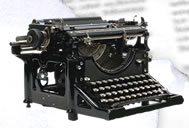The production of inaccurate war flicks with unlikely plots is a proud tradition that is alive and well in every film capitol around the globe and not likely to vanish any time soon. Today's film critics seem to have a good deal more patience when reviewing the genre -as compared to the jaded, old ink-slinger who was charged with the task of summing up this silent film from 1918: "On to Berlin".
"The American-made war dramas must be giving the folks back home a swell idea of what The War isn't like...William Fox is accused of producing "On to Berlin"
Before there was Sad Sack, there was
Old Bill
, Bert and Alf -the later three being the creation of World War One British cartoonist Bruce Bairnsfather (1888-1959; and the former was the brainchild of World War Two Army Sergeant George Baker, 1915 - 1975). Bairnsfather was the creator of a popular cartoon called "Old Bill" which was widely believed by the "Tommies" to accurately depict the hardships on the Western Front.
This illustrated article is a theater review of
The Better 'Ole; a funny, well received play written by the cartoonist and staged in London during the closing weeks of the war.
The Americans who fought in the Second World War had Bob Hope to entertain them, and their fathers who fought in the First had
Elsie Janis (1889 - 1956). Like Hope, Janis traveled close to the front lines and told the troops jokes, and sang them songs - making it clear all the while that her sympathies and affections for the Doughboys were strong - and they, in turn, loved her right back. In the attached 1936 reminiscence Janis recalls some of her experiences from the six months in which she entertained the American Army in France; she also speaks of her roll entertaining the volunteer American Army of the 1930s, as well.
Click here to read about the U.S.O. entertainers...
Not surprisingly, special effects were an important box office draw during the Silent Era. This article reports on the popularity of war movies in 1915 and explains how some of the effects were created.
This article is essentially a collection of lyrics from an assortment of songs sung by the Black Doughboys who were charged with the task of loading and unloading trucks far behind the front line trenches. It was written in 1927 to serve as a review for
Singing Soldiers
by John J. Niles, who compiled the labor songs while stationed in France as a fighter pilot:
"All dese colored soldiers comin' over to FranceAll dese soldiers an' me
Goin' to help de Whites make de Kaiser dance
All dese soldiers an' me..."
